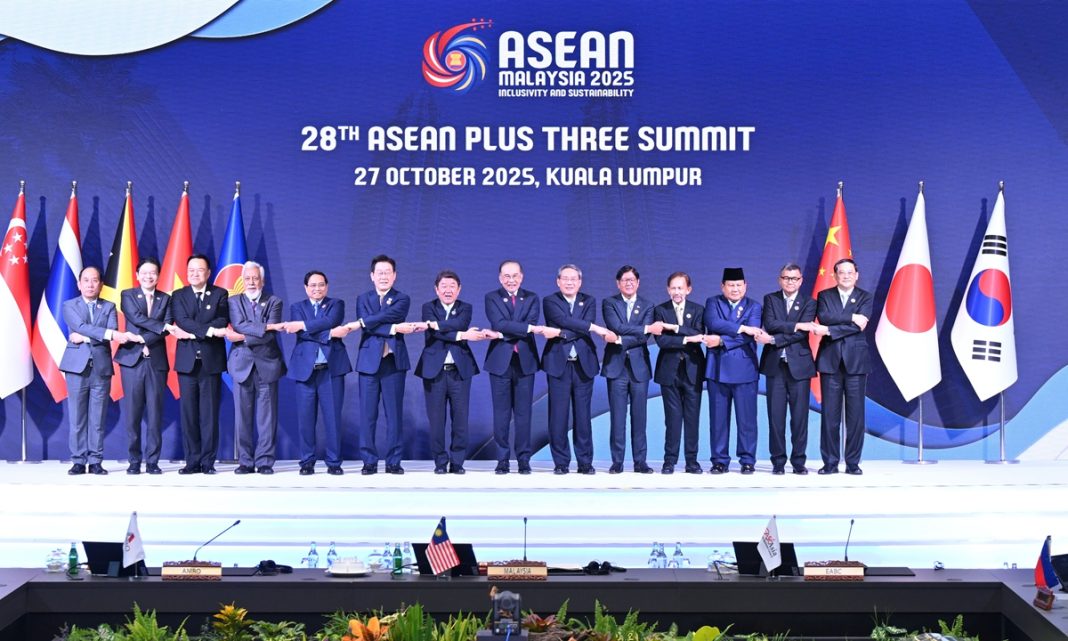
BEIJING: Chinese Premier Li Qiang said Monday that China is willing to strengthen the alignment of development strategies with various parties, uphold openness and cooperation, and continuously unleash economic potential to explore broader development space.
Li made the remarks when addressing the 28th ASEAN Plus Three Summit in Malaysia, the Xinhua News Agency reported.
Li first congratulated Timor-Leste on officially joining the ASEAN family. Over the past year, cooperation among ASEAN, China, Japan and South Korea has generally maintained a positive momentum, demonstrating the resilience and vitality of the East Asian economy, Li said.
At the same time, due to complex changes in the international economic and trade landscape, East Asia is facing growing economic difficulties and challenges, with increasing instability and uncertainty in development, he added.
In confronting these difficulties, Li said, wisdom and strength can be drawn from the past. For decades, East Asia has been one of the fastest-growing regions in the world, creating one economic miracle after another – achievements that continue to inspire and fill us with pride, he added.
Openness and cooperation are valuable experiences explored and accumulated through practice, and should be cherished and carried forward at all times, so that they remain a marked advantage and a key to success for East Asia’s economy, Li said.
Li also met with Australian Prime Minister Anthony Albanese, and European Council President Antonio Costa separately on the sidelines of the leaders’ meetings on East Asian cooperation on Monday, per Xinhua.
Openness and commitment
ASEAN leaders and dialogue partners will focus on strengthening regional economic integration and strategic cooperation during the RCEP Summit and the East Asia Summit (EAS) on Monday, according to Malay Mail.
The meetings are expected to chart new directions for trade, investment and regional stability amid a complex global environment, the report said.
Li on Monday called for preserving the multilateral trading system with greater resolve.
Li made the remarks while addressing the fifth Regional Comprehensive Economic Partnership (RCEP) Leaders’ Meeting. He said that China will always support ASEAN centrality and stands ready to work with all parties to uphold true multilateralism.
He also called for accelerating the expansion process of the RCEP and supporting applicants such as Hong Kong, China, in joining the free trade treaty.
Earlier on Monday, Indonesian President Prabowo Subianto’s message, delivered by Coordinating Minister for Economic Affairs Airlangga Hartarto, urged ASEAN to leverage the RCEP as a platform to strengthen resilience and promote rules-based trade across the Indo-Pacific region, according to Malay Mail.
This partnership should also remain open to others wishing to join RCEP, Prabowo added.
The RCEP, the world’s largest free trade deal to date, covers 10 member states of ASEAN and its five free trade agreement partners, namely China, Japan, South Korea, Australia, and New Zealand, Xinhua reported in March.
At a meeting with Singapore’s Acting President Eddie Teo, Li also said on Sunday that China is ready to work with Singapore and other ASEAN members to make the China-ASEAN Free Trade Area 3.0 a success and jointly achieve greater development, Xinhua reported.
Malaysian Prime Minister Anwar Ibrahim on Sunday hailed the China-ASEAN Free Trade Area 3.0, set to be signed on Tuesday, as a pivotal milestone that will open a new chapter in ASEAN’s strategic partnership with China and strengthen the region’s collective economic resilience, according to The Edge Malaysia.
Recent data shows that in the first three quarters of this year, imports and exports between China and ASEAN totaled 5.57 trillion yuan ($782 billion), up 9.6 percent year-on-year. ASEAN remained the largest trading partner of China.
In September, ASEAN Secretary-General Kao Kim Hourn told media in Nanning, South China’s Guangxi Zhuang Autonomous Region that with the China-ASEAN Free Trade Area 3.0, economic cooperation between ASEAN and China is expected to reach new heights, particularly in new areas like e-commerce, digital trade, and digital payments, which are very important, particularly in the context of current global economic dynamics.
Amid rising protectionism, unilateralism, and anti-globalization headwinds, China and ASEAN — along with the broader ASEAN Plus Three framework — must further tap their cooperation potentials, particularly by upgrading regional economic partnerships and related mechanisms to better withstand external pressures such as tariff impacts, Xu Liping, director of the Center for Southeast Asian Studies at the Chinese Academy of Social Sciences, told the Global Times.
Xu said that the Chinese premier’s remarks signaled that China is embracing a more open and proactive stance toward the world, particularly its neighbors. Xu noted that China is moving from a model of “reciprocal openness” to one of “proactive openness,” underscoring its commitment to the principles of equality and mutual benefit, as well as its sense of responsibility as a major power.
Jointly defending unilateralism
In his remarks during the ASEAN Plus Three summit, South Korean President Lee Jae-myung said Monday that South Korea, China and Japan should step up cooperation with ASEAN to better respond to emerging risks, including trade protectionism and shifting global supply chains, according to Yonhap.
“Today, we are facing new geo-economic challenges such as protectionism and the restructuring of global supply chains,” said Lee. “We must accelerate cooperation under the ASEAN+3 framework involving South Korea, China and Japan.”
Malaysian Prime Minister Anwar said on Sunday that “rising protectionism and shifting supply chains remind us that resilience depends on … adaptability… ASEAN must not stand still. We must have the courage to forge new partnerships and the foresight to deepen existing ones.”
The trend of unity among participating countries in opposing protectionism is evident at this year’s summit, as most of them have been victims of US tariffs, Qu Jianwen, vice dean of the School of International Studies at Yunnan University, told the Global Times.
While many of these countries have engaged in one-on-one negotiations with the US, they are increasingly inclined to stand together, as collective action carries greater weight, said Qu. –The Daily Mail-Global Times news exchange item




